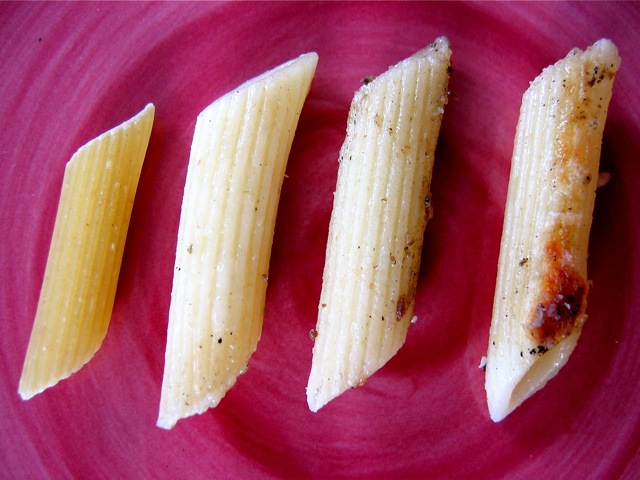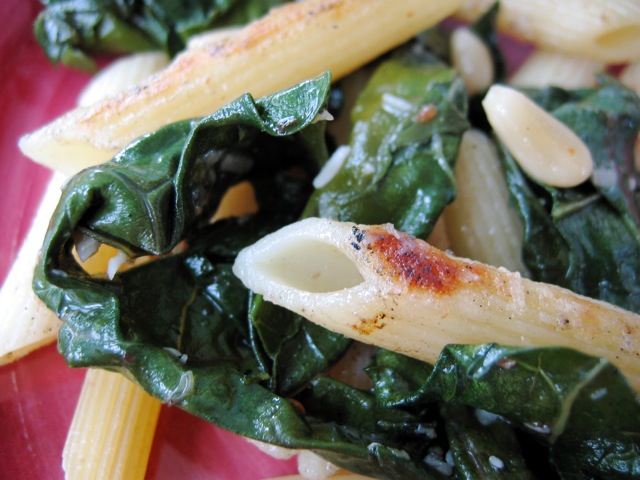
reference-image, l
(article, Bob Passaro)
[%pageBreakSettings nobreak=true] In college and afterwards, I cooked for a living. I was a line cook, cranking out 100 meals a shift. For a long time, I worked the breakfast rush at a Salt Lake City place called the Park Café, churning out rote but tasty omelets and benedicts from 6 a.m. till noon. I was in constant motion, and I loved it. While I worked, I listened to the clatter of silverware and plates, the rolling chatter. I watched the people on the sidewalk, waiting for a table. Gradually, the sidewalk cleared, the tickets slowed and stopped, the lunch cook arrived. A quick cleanup, and I was out the door before 1 p.m. — still time to get up to Alta for a couple of hours of skiing. [[block(sidebar). h1.Featured recipe]] Mostly I just followed the restaurant’s recipes, over and over at a frantic pace. This takes its own kind of skill. Still, there’s another way of cooking, a way that I always admired and tried to emulate, but for a long time didn’t understand. My brother, Dave, cooks this way. I went to visit him once on vacation at a beach house. He was cooking dinner for everyone: several pans on the stove, directing someone outside grilling peppers on the barbecue, the rest of us gathered around talking and drinking wine. He was so casual. He’d get busy with one part of the dish or get involved with the conversation or be teasing the kids, and then suddenly blurt out, “Oh!” and swing around to a sauté pan that he had seemingly forgotten about. He’d grab the handle and give the contents a flip, at what seemed to be the last moment before it burned. During another family holiday, he made a pasta dish. My mother wandered into the kitchen and looked toward the stove. My brother, of course, was busy doing something else. [%image reference-image float=right width=400 caption="How do you get from raw to cooked?"] “David, is that burning?” she asked. “Oh, it’s supposed to burn,” he said, then reached over and turned the pasta, revealing the perfectly browned penne that had been at the bottom. Sometimes I’d be helping him with a meal, and he would just wander off. He’d be doing something out in the garage or out in the driveway, talking with a neighbor, only to reappear and remind me to take something out of the oven or off the stove at the right moment. Once, at my house, he was helping prepare dinner, and simply vanished. He walked down the block to our neighborhood pub for a black-and-tan, then returned to a chaotic kitchen in time to weave all the pieces of the meal together with graceful ease. Dave's nonchalance in the kitchen is odd, really, because in some ways my brother can be a little uptight. But if you ever ask him for the recipe for something he’s made, he’ll just say, “Oh, you know, take about five cloves of garlic . . .” and then give wildly approximate amounts and cooking times. I don’t think I’ve ever seen him use a measuring cup or spoon. It’s all by eye, by feel, by taste. He gives the impression that cooking is no big deal, nothing to get stressed about, nothing that should interrupt your sudden urge for a black-and-tan. Cooking is something any idiot can do while simultaneously watching a ballgame on TV, entertaining the guests, or showing someone his new bicycle in the garage. Dinner, as a result, seems to happen by magic. Bowls and plates of incredible food will simply appear on the table, a fabulous meal emerging from chaos. Even with nothing more to go on than random Tupperwares of leftovers pulled from the fridge, my brother will regularly create wonderful improvised meals. For a long time, I tried to imitate my brother’s offhand way in the kitchen, but I rarely ended up with a successful meal. Edible, maybe, but not the kind of thing that makes someone ask for the recipe or compliment the cook. Then one day, I stumbled upon a word I’d never heard before, an Italian word: sprezzatura. I don’t know Italian, and this is one of those words that apparently doesn’t translate easily into English. But basically it means something like “careless artfulness,” in the sense of airy nonchalance masking great skill and conscientiousness. The word seems to have been coined in the 16th century by one Baldassare Castiglione, in a book he wrote about how to excel as a member of a noble court. He had worked for a duchess. The Book of the Courtier was published in 1528, and the following year Castiglione died of the plague. But we can be glad, at least, that he left us this wonderful word. As Castiglione wrote: bq. It is an art which does not seem to be an art. \[One must\] avoid affectation . . . to practice in all things a certain sprezzatura or nonchalance, which conceals all artistry and makes whatever one says or does seem uncontrived and effortless . . . I am sure that grace springs especially from this . . . whereas, in contrast, to labor at what one is doing and, as we say, to make bones over it, shows an extreme lack of grace. This was my brother’s cooking. As I watched him over the years, it slowly dawned on me that he did know exactly what he was doing, even if he appeared distracted or nonchalant. [%image pasta float=left width=400 caption="Sprezzatura Pasta"] And while I had mostly worked in restaurants as a means to an end — to earn some money in college and, later, to fund a ski habit — he had worked in restaurants as a means to a career. It was the old, familiar story: he started as a dishwasher and worked his way up through the kitchen. Over many years, he worked in many kitchens. Later, he went to work selling food to restaurants and was in frequent contact with various chefs. Cookbooks? Yes, I think he did read cookbooks — but not while he was cooking. I think he browsed through them and absorbed ideas, but he didn’t refer to them while he was cooking — at least, not that I ever saw. So Dave wasn’t making things up quite as much as it seemed. He simply has a foundation of skill that I never had. All this time, I thought it just came easily to him. Actually, it was sprezzatura. After several years of watching my brother make a certain pasta dish involving Parmesan and chard, I began attempting it on my own. Its trick seems to be mostly in the timing. Leave the pasta and cheese on the burner for too long and you burn it, or at least overcook the pasta. Leave it not long enough, and you don’t get that perfectly salty, tender, and crunchy (but not too crunchy) pasta. After a number of tries, my wife and I were able to cook a dish that was close enough. One night, we made the dish for a friend who was just finding her way in the kitchen and who was eager to try new things and adopt recipes from friends. She loved the pasta and asked for the recipe. So I rattled off instructions in the vague, arm-waving way that my brother does. Our guest seemed confident she could take it on. But the dish is deceptively simple. She called my wife the next week, saying that her kitchen smelled of burned pasta and that what was salvageable of the dish was bland. It might look easy, but it’s not. It’s sprezzatura._ p(bio). Bob Passaro is a newspaper copy editor and a long-ago line cook. He lives in Eugene, Oregon, with his wife, Culinate contributor Jamie Passaro, and their two daughters.

reference-image, l

pasta, l

feature-image, l

newsletter-image, l